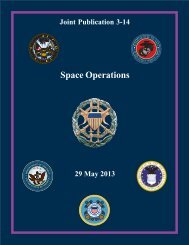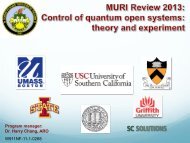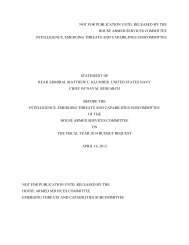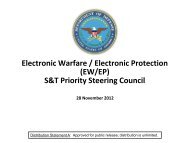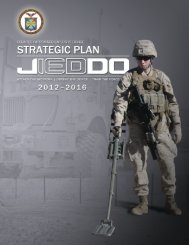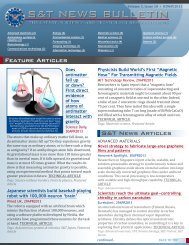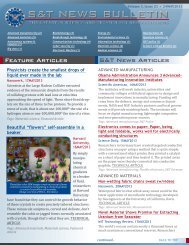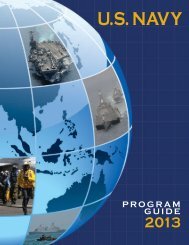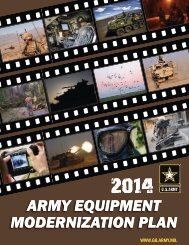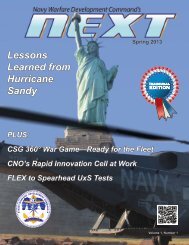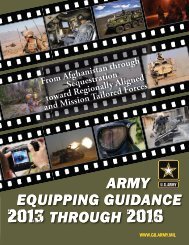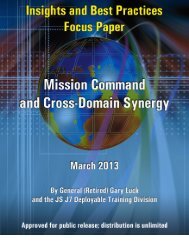JP 3-01 Countering Air and Missile Threats - Defense Innovation ...
JP 3-01 Countering Air and Missile Threats - Defense Innovation ...
JP 3-01 Countering Air and Missile Threats - Defense Innovation ...
You also want an ePaper? Increase the reach of your titles
YUMPU automatically turns print PDFs into web optimized ePapers that Google loves.
Chapter II<br />
authority down to a RADC/SADC. The air <strong>and</strong> missile threats posed by adversaries are<br />
normally known, <strong>and</strong> plans/orders, including ROE, are approved in anticipation of the<br />
indications <strong>and</strong> warnings that would precede a possible hostile launch.<br />
d. Existing plans <strong>and</strong> orders address a number of known cross-AOR threats. A<br />
primary concern involving cross-AOR fires/operations is the potential difficulty of<br />
prioritizing tactical actions of a supporting unit. Support relationships between GCCs<br />
can be clearly established, but responding to conflicting requirements or priorities can create<br />
an operational dilemma: How does the unit comm<strong>and</strong>er respond to multiple tasks? When<br />
may there be conflicting times <strong>and</strong> locations? This type of situation should be mitigated<br />
through exercises <strong>and</strong> rehearsals.<br />
e. Other essential considerations in cross-AOR BMD are differences in GCCs plans <strong>and</strong><br />
procedures, comm<strong>and</strong> relationships, <strong>and</strong> battle management procedures. For example,<br />
comm<strong>and</strong> relationships <strong>and</strong> the engagement procedures for homel<strong>and</strong> BMD are<br />
significantly different than those for other regional BMD. These differences can be<br />
overcome through prior planning, training, <strong>and</strong> rehearsals among the supported <strong>and</strong><br />
supporting comm<strong>and</strong>ers <strong>and</strong> tasked units. This applies to both the offensive <strong>and</strong> defensive<br />
aspects of a missile defense strategy.<br />
11. General<br />
SECTION B. MULTINATIONAL CONSIDERATIONS<br />
Most joint operations are now conducted within a multinational context (i.e., an alliance<br />
or coalition). Each MNF operation is unique, <strong>and</strong> the international situation, along with the<br />
perspectives, motives, <strong>and</strong> values of each MNF member may vary. The JFC (who may be<br />
the multinational force comm<strong>and</strong>er [MNFC]) must evaluate key considerations <strong>and</strong><br />
differences involved in planning, coordinating, <strong>and</strong> conducting counterair operations in a<br />
multinational environment. A major characteristic of operating in the multinational<br />
environment is that consensus through compromise is often essential to success. Within<br />
designated comm<strong>and</strong> authorities <strong>and</strong> in close coordination with the civilian leadership, the<br />
MNFC may have responsibilities to both national <strong>and</strong> foreign leaders <strong>and</strong> must be prepared<br />
to negotiate with MNF partners when planning <strong>and</strong> developing ROE, ACMs, weapon control<br />
measures, <strong>and</strong> other appropriate procedures <strong>and</strong> processes such as CID.<br />
12. Comm<strong>and</strong> Relationships<br />
a. The traditional comm<strong>and</strong> relationships used by US forces generally may not be<br />
possible with all MNF partners because of political necessity. Some MNF partners may<br />
accept US comm<strong>and</strong> authorities; others may not. In MNF operations, underst<strong>and</strong>ing the<br />
agreed upon comm<strong>and</strong> relationships <strong>and</strong> the related comm<strong>and</strong> authorities is key to<br />
developing the desired unity of effort for counterair operations.<br />
b. If comm<strong>and</strong> relationships <strong>and</strong> support requirements (e.g., security <strong>and</strong> logistics) are<br />
not already provided for in existing agreements, the JFC should request to have such<br />
agreements concluded (memor<strong>and</strong>ums of agreements, technical arrangements, status of<br />
forces agreements, etc.) between US <strong>and</strong> MNF members conducting counterair operations.<br />
II-16 <strong>JP</strong> 3-<strong>01</strong>



